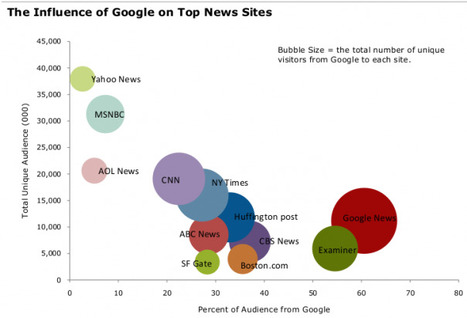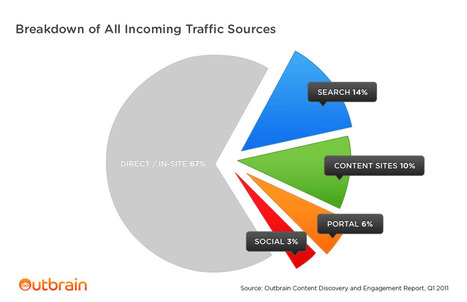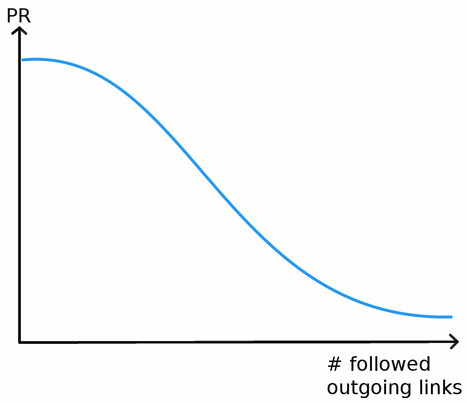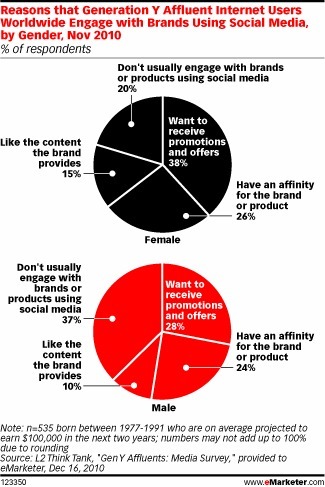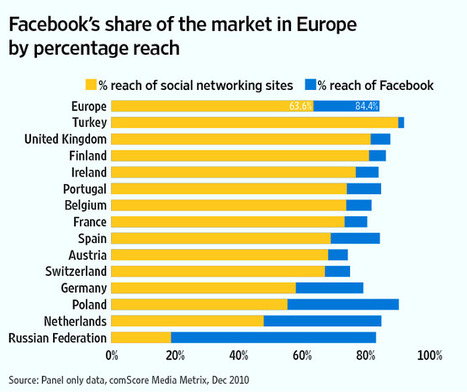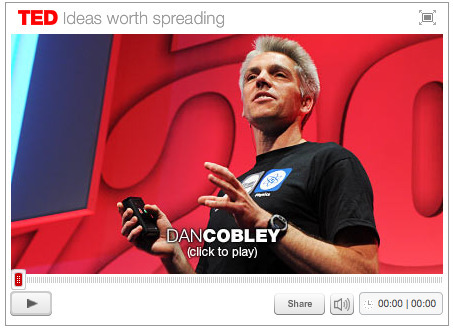 Your new post is loading...
 Your new post is loading...

|
Scooped by
Robin Good
May 11, 2011 2:23 AM
|
Simply put, there is no one single way to measure online influence. And in the past, measuring influence has been based on popularity or celebrity.
In a recent post, Brian Solis, principal of The Altimeter Group, wrote, “If we look beyond the word ‘influence,’ we see that the ability to measure effect is complicated and elusive.
I believe, however, that we’re closer to measuring social capital, at least in a digital sense, than we are [to] measuring outcomes.” This means that online influence isn’t about popularity, it’s about expertise.

|
Scooped by
Robin Good
May 10, 2011 12:01 PM
|
Google is still a more important source of traffic for major news websites than social media, a new study shows -- but Facebook is climbing in importance.

|
Scooped by
Robin Good
May 10, 2011 11:56 AM
|
I think it is probably reasonable to assume that a start-up (particularly one that had been bootstrapped) would have this sort of budget for online marketing in the early days though I would urge the need for a stronger budget.

|
Scooped by
Robin Good
May 7, 2011 2:03 PM
|
Earlier this year, Facebook introduced a new type of advertising that highlights the activity of a user's friends who have interacted with a given brand on the site. ...

|
Scooped by
Robin Good
May 2, 2011 1:12 PM
|
Now that we have a lot more data in the hopper, it’s beginning to look like social media isn’t the magic pill many people thought it would be when it comes to marketing.
Today, we have numbers from Outbrain. This is the company that makes the “You Also Might Like” widget that suggests related content at the bottom of a blog post. They examined traffic from 100 million sessions across more than 100 premium publishers in order to find out how people are discovering content and what happens when they get there.
As we’ve seen from other surveys, the majority of traffic comes from search engines (41%) and content sites (31%). They say social media sends 11% of the traffic, which is better than the 1% ForeSee suggested, but it’s still not fabulous.
The bigger bad news is that once those social media butterflies land at your site, they don’t stay long.

|
Suggested by
Go Game Guru
May 2, 2011 9:23 AM
|
Goes to show that with a little bit of thought, QR Codes can actually be enticing and engaging rather than the utter poop we're used to seeing.

|
Scooped by
Robin Good
April 30, 2011 5:08 PM
|

|
Scooped by
Robin Good
April 30, 2011 5:30 AM
|
One thing that have bothered me for some time, is how Google treat websites that buy and/or sell links. Not that I am a fan of buying or selling links. I'm proud to say I've never done either.

|
Scooped by
Robin Good
April 26, 2011 4:01 AM
|
Google is now showing Instant Previews -- small thumbnails that show when a user mouses over an ad -- for all search ads, presumably helping to qualify...

|
Scooped by
Robin Good
April 23, 2011 9:59 AM
|
Most of us in the PPC world know that testing ads is a great idea - almost necessary optimization work.

|
Scooped by
Robin Good
April 23, 2011 6:04 AM
|
Nowadays, it seems that everyone does search engine optimization, or at least make the claim.

|
Scooped by
Robin Good
April 21, 2011 1:49 AM
|
A widely discussed article in Wired last summer posited the idea that the web is dead.
The argument, which, on closer inspection appeared based on semantics, predicted that consumers would experience the web via peer-to-peer networks like Facebook and, increasingly, apps, in the future.
If that proves to be the case, a dead web may be good for advertising

|
Scooped by
Robin Good
April 20, 2011 5:12 PM
|
So your company has mastered search engine optimization (SEO) for the brand's main Website and established a killer social media strategy, both of which are driving hordes of traffic and new business. Way to go. Both are critical to your company's success online, but have you connected these two very important dots?
If you're like most major companies, your brand's Facebook page doesn't even appear in the first 20 search results for your company on Google, even if your Website does. This is apparently the case for more than 70% of major brands, according to a recent study conducted by SEO services firm BrightEdge.
|

|
Scooped by
Robin Good
May 10, 2011 12:04 PM
|
Mid of 2010 fellow StateOfSearch blogger Louis Venter had first look at the new and upcoming HTML 5 mark-up. Keep in mind that HTML 5 is not ready yet and it’s still a work in progress – officials say we’ll see it finalized by end of 2012 – but I’m pretty sure it’s more going to be 2013 or so. But that’s not the main thing I want to look at. I just thought it might be nice to point out some of the changes that can have an impact in regards to on-page SEO and how developers (and SEOs) currently do use existing elements and tags.
I found it to be extremely interesting, having a technical background, in which direction the usage of HTML 5 is heading. Even though, and I probably should have put this in my summary, I don’t think its ground breaking – but it does make a lot of sense.

|
Scooped by
Robin Good
May 10, 2011 12:00 PM
|
Luxury marketers take note, according to a February 2011 Affluence Collaborative survey, wealthy internet users connect with brands on social networks for significantly different reasons than the general population. The social networks they use to do so are different, too.
Among the general population, the main reason cited for connecting with brands on social networks was to receive deals and discounts. This result from the Affluence Collaborative survey backs up earlier research from several sources on why consumers follow brands on social sites.

|
Scooped by
Robin Good
May 7, 2011 2:06 PM
|
In recent months we’ve been especially focused on helping people find high-quality sites in Google’s search results. The “Panda” algorithm change has improved rankings for a large number of high-quality websites, so most of you reading have nothing to be concerned about. However, for the sites that may have been affected by Panda we wanted to provide additional guidance on how Google searches for high-quality sites.
Our advice for publishers continues to be to focus on delivering the best possible user experience on your websites and not to focus too much on what they think are Google’s current ranking algorithms or signals. Some publishers have fixated on our prior Panda algorithm change, but Panda was just one of roughly 500 search improvements we expect to roll out to search this year. In fact, since we launched Panda, we've rolled out over a dozen additional tweaks to our ranking algorithms, and some sites have incorrectly assumed that changes in their rankings were related to Panda. Search is a complicated and evolving art and science, so rather than focusing on specific algorithmic tweaks, we encourage you to focus on delivering the best possible experience for users.
What counts as a high-quality site?
Our site quality algorithms are aimed at helping people find "high-quality" sites by reducing the rankings of low-quality content. The recent "Panda" change tackles the difficult task of algorithmically assessing website quality. Taking a step back, we wanted to explain some of the ideas and research that drive the development of our algorithms.

|
Scooped by
Robin Good
May 5, 2011 4:54 AM
|
Online networking has already revolutionized personal life, but it is now having a profound impact on business life. Companies need to understand how it will change the way they operate or risk falling behind.

|
Scooped by
Robin Good
May 2, 2011 9:31 AM
|
Marketing Pilgrim's SEO Channel is sponsored by SEOmoz, the leading provider of SEO tools and resources.

|
Scooped by
Robin Good
May 2, 2011 9:21 AM
|
TweetWhen I wrote Why all SEOs should learn to program lots of people sent me compliments and praise. That was fun. Now time for the hate, I suspect.
If SEOs need to learn to program, then web developers need to learn SEO.

|
Scooped by
Robin Good
April 30, 2011 5:03 PM
|
I like easy. Recently I discovered a way to create QR Codes using Google’s URL shortening service. Here’s how.

|
Scooped by
Robin Good
April 30, 2011 5:29 AM
|
Self-serve advertising is massive online, you only have to take a look at Google Adsense of Facebook Adverts and see just how much revenue they bring in their respective companies.

|
Scooped by
Robin Good
April 25, 2011 6:46 AM
|
Browser- and PC-based ads are missing today's audience, which is spending more and more time communicating through mobile apps.

|
Scooped by
Robin Good
April 23, 2011 6:05 AM
|
Yesterday, the folks at SEOMoz released a study that shows a correlation between the amount of action your website gets on Facebook (shares), Twitter (tweets), and Google Buzz (shares) and how websites in the top 30 search results rank on Google’s SERP (search engine results page).
There has been plenty of debate about how influential traffic and links from social networks are in Google’s algorithm. No matter what your thoughts are on the matter, the data is hard to ignore.

|
Scooped by
Robin Good
April 23, 2011 6:00 AM
|
I don't think I've embedded a video by someone else on this blog in 5 years.
However, this piece about marketing and physics is beyond brilliant: It defines marketing in a way that totally, completely makes sense. It's only 7 minutes long. Watch it.

|
Scooped by
Robin Good
April 20, 2011 5:13 PM
|
Although consumers’ communication habits have evolved with the rising popularity of social media and smartphones, brands are still turning to their dependable friend — email — to attract and retain customers and boost their bottom lines.
There’s no denying that email is showing signs of decline — the number of visitors to web-based email sites fell 6% in 2010 compared to the previous year, and email engagement declined at an even greater rate, according to a report from digital analysis company comScore.
|



 Your new post is loading...
Your new post is loading...



